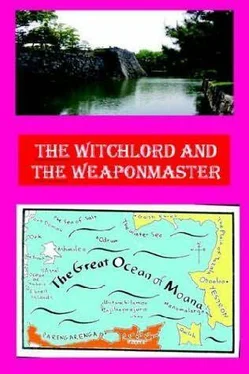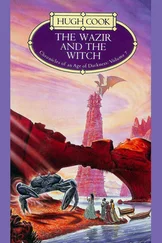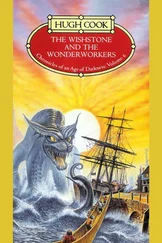Hugh Cook - The Witchlord and the Weaponmaster
Здесь есть возможность читать онлайн «Hugh Cook - The Witchlord and the Weaponmaster» весь текст электронной книги совершенно бесплатно (целиком полную версию без сокращений). В некоторых случаях можно слушать аудио, скачать через торрент в формате fb2 и присутствует краткое содержание. Жанр: Фэнтези, на английском языке. Описание произведения, (предисловие) а так же отзывы посетителей доступны на портале библиотеки ЛибКат.
- Название:The Witchlord and the Weaponmaster
- Автор:
- Жанр:
- Год:неизвестен
- ISBN:нет данных
- Рейтинг книги:5 / 5. Голосов: 1
-
Избранное:Добавить в избранное
- Отзывы:
-
Ваша оценка:
- 100
- 1
- 2
- 3
- 4
- 5
The Witchlord and the Weaponmaster: краткое содержание, описание и аннотация
Предлагаем к чтению аннотацию, описание, краткое содержание или предисловие (зависит от того, что написал сам автор книги «The Witchlord and the Weaponmaster»). Если вы не нашли необходимую информацию о книге — напишите в комментариях, мы постараемся отыскать её.
The Witchlord and the Weaponmaster — читать онлайн бесплатно полную книгу (весь текст) целиком
Ниже представлен текст книги, разбитый по страницам. Система сохранения места последней прочитанной страницы, позволяет с удобством читать онлайн бесплатно книгу «The Witchlord and the Weaponmaster», без необходимости каждый раз заново искать на чём Вы остановились. Поставьте закладку, и сможете в любой момент перейти на страницу, на которой закончили чтение.
Интервал:
Закладка:
So Sken-Pitilkin opened his mouth – then closed it again, firmly.
After all, in Ibsen-Iktus, Guest had been at war, hence could plead necessity. And, besides, it is contrary to human nature for anyone to concern themselves with large-scale tragedies remote from their own persons. To those who are of tender spirit, the death of a small mouse or the agony of a bird in a cat's jaws makes more impact than the death by starvation of some half a million people in a nation a continent removed. Guest had been closely, intimately concerned with the death of the boat-seller Umbilskimp. That death had been consequent upon Guest's own moral cowardice. For he had seen fit to exercise the prerogative of mercy, yet had restrained himself for mere fear of his father's scorn.
Had Guest a fragile child unschooled in the ways of power, then Sken-Pitilkin might have seen fit to mitigate his suffering with words of comfort and of absolution. But Guest was no such child. He was a warlord's son with a soul as ugly as his bat-flap ears. So Sken-Pitilkin, seeing that the young man was truly suffering, was pleased to see as much. And, having done his duty by making Guest's crime of crimes explicit, unavoidable and (with luck) unforgettable, the wizard of Skatzabratzumon rose, dusted down his fishermen's skirts, and departed without so much as a word of farewell.
Left to himself – for Rolf Thelemite and Morsh Bataar were still keeping their distance, their fumbling attempts at comfort having earlier been rudely rebuffed – Guest Gulkan sat alone by the confluence of the Yolantarath and the Pig.
The Pig, which had earlier flowed clear, was running muddy now, for upstream was Guest Gulkan's army, and men, clothes and horses were being washed in the river's waters. The Pig emptied its muddiness in a whirlygig rush into the slow-mud slurge of the ineffable Yolantarath, the name of which river reminded Guest, by poetic association, of Yerzerdayla, the woman who – he supposed – dwelt still in Gendormargensis.
Now that Guest was emperor, more or less, he supposed he could take the woman from Thodric Jarl. Yes, and hang Jarl unless that Rovac warrior would give him the woman, and swear fealty to him, and lick his boots in proof of such fealty.
So thought Guest.
But such imaginings proved strangely comfortless, for still he could not shake free the memories of the hangings. The bodies black against the sun. Old man Umbilskimp, wheezing heavily, making odd fluttering gestures with his hands as Thodric Jarl lumbered toward him.
The sky was darkening, now, the broad sky above the wide reach of the Yolantarath growing heavy with clouds. As Guest sat by the river, he shivered, suddenly cold. For some reason, he suddenly thought there was snow all around. Which was ridiculous.
Despite the lateness of the season, the first snowfall was yet days distant. Still. Guest imagined snow.
There was snow, and it was cold, and now Guest realize that there was an animal padding through the cold of that snow. It was a beast of snow, and was as white as the snow. He knew its weight from its silence.
Then it breathed upon him.
Its breath was hot on his nape.
In all his life, Guest had endured nothing more terrifying than that hot breath breathing on him from out of the silence of snow. He tried to stand, tried to run. But could not. For his arms and legs were bloody shreds, and as the pain of his mutilations hit him he started to scream, and was screaming still when Rolf Thelemite and Morsh Bataar came running to his rescue.
Chapter Seventeen
Babaroth: a town some two leagues (4,000 paces) north of the confluence of the Pig and the Yolantarath. The "Battle of Babaroth," as it is commonly known, took place at the Pig itself.
In that battle, the Witchlord Onosh defeated his enemies with the help of his Rovac-born general Thodric Jarl. The revolutionary leader Sham Cham, chiefest of the Witchlord's enemies, died when an arrow took him in the eye, whereupon the Weaponmaster Guest Gulkan led the revolutionary forces in a vigorous retreat.
By the next day, Guest Gulkan had fully recovered from his waking nightmare. Indeed, he disclaimed all knowledge of any such nightmare, claiming that a good night's sleep had obliterated his memories of the trauma of the previous evening. Guest celebrated his full recovery from nightmare's claims by holding a little ceremony in honor of the Battle of Babaroth. In that battle, Witchlord had defeated Weaponmaster; but, Guest Gulkan having made himself his father's master, the Witchlord Onosh was forced to kneel upon the earth -
And to eat a small portion of that earth as a token of his son's supremacy.
Shortly thereafter, as Guest Gulkan's army marched through the stretch of trees which lay between the Pig and the settlement of Babaroth, Sken-Pitilkin was audacious enough to question Guest Gulkan's wisdom.
"Your father's fate lies in your hand," said Sken-Pitilkin.
"You have a choice of how you dispose of him. Is your choice to murder him?"
"I have no thought of murder in mind," said Guest.
"Then," said Sken-Pitilkin, "for the life of me, I cannot imagine what possessed you to make your father eat mud."
"Why shouldn't I?" said Guest. "I have defeated him, and he should acknowledge as much."
"Yes," said Sken-Pitilkin. "But the manner in which you compel his acknowledgement is likely to make it impossible for the two of you to live in peace. If you push him too far, then he will rise against you, even if his resistance serves merely to ensure his own execution."
"How should I treat him, then?" said Guest.
"With affection," said Sken-Pitilkin. "With love. He is your father, after all."
"Love!" said Guest bitterly. "What love has he ever shown me?
I saved his life, yet even then he showed me no love."
"You spared him," said Sken-Pitilkin. "Yet sparing a prisoner is but a casual convention of war. It is hardly love."
"No!" said Guest, with violence. "I save him! In the river, the Yolantarath! Years ago!"Sken-Pitilkin was taken aback by the Weaponmaster's vehemence. Was the young man losing his mind?
"Guest," said Sken-Pitilkin, "you forget yourself. It was not your father you saved. It was Eljuk. Your brother Eljuk."
"Eljuk!" said Guest. "No, it was my father. I saw the future, you see. There was my father, in the river, in the Yolantarath. He was drowning, Pitilkin. That's why I went into the water. I thought it was my father."
"But it wasn't," said Sken-Pitilkin.
"But I thought it was!" said Guest. Sken-Pitilkin absorbed this, thought about it, then said:
"Well, Guest, whoever you thought you were saving, it was Eljuk you saved. And, anyway, your father offered you a reward for the saving. He was obligated. You could have asked for anything.
But you chose to ask for a ridiculous trifle, a bauble of a title.
You chose to be the Weaponmaster, which makes you a living joke, for all the world knows you to be the master of no weapon."
Thus did Sken-Pitilkin vent his scorn upon the Weaponmaster, hoping to break the young man out of his mood of bitter self-pity.
For surely honest anger was preferable to such self-pity. But such was Guest's distress that he absorbed Sken-Pitilkin's dire and unpardonable insult without so much as the flicker of an eyelash.
"I chose the title," said Guest, "because it was an ornament, a bauble, a trifle, a toy. But as for the larger things, like my life, say, like the woman Yerzerdayla – my father should have given these for love."
Now Sken-Pitilkin began to understand the depths of Guest's suffering. After saving his brother Eljuk, the boy Guest had not asked for any great thing by way of payment for services rendered, for he thought his father should give him the great things out of love. But his father had given him nothing.
Читать дальшеИнтервал:
Закладка:
Похожие книги на «The Witchlord and the Weaponmaster»
Представляем Вашему вниманию похожие книги на «The Witchlord and the Weaponmaster» списком для выбора. Мы отобрали схожую по названию и смыслу литературу в надежде предоставить читателям больше вариантов отыскать новые, интересные, ещё непрочитанные произведения.
Обсуждение, отзывы о книге «The Witchlord and the Weaponmaster» и просто собственные мнения читателей. Оставьте ваши комментарии, напишите, что Вы думаете о произведении, его смысле или главных героях. Укажите что конкретно понравилось, а что нет, и почему Вы так считаете.












